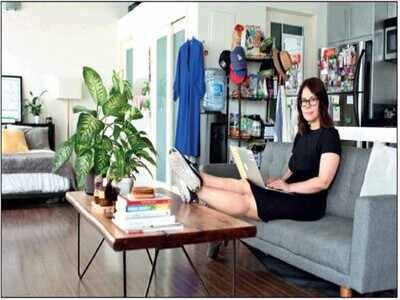
Many young American urbanites have resigned themselves to a life of non-ownership, abandoning the dream of their parents and grandparents and great-grandparents before them, often out of financial necessity.
But renting isn’t just a matter of necessity these days. It’s become almost posh. While paying to borrow decor, clothing and offices is nothing new, the options have grown substantially in recent years. In fact, some would say we’re living in the Gilded Age of renting.
“We were raised to save and invest and buy a home and do all of these things,” said Miki Reynolds, 38, who pays a monthly fee for much of what she uses in her day-to-day life in Los Angeles. “But my mentality to currently rent — it’s not YOLO. It’s more living in the present as much as planning for the future because I feel like nothing is guaranteed.”
Reynolds, the executive director of a nonprofit, rents both her downtown apartment and her co-working space. It’s easy and flexible to live this way, Reynolds said. She feels like she’s getting a deal on trendy furniture and clothing without being stuck with any of it. And she likes that she could pick up and move if she wanted, no moving trucks required. The point of ownership, Reynolds said, is not to own at all, but rather “to experience the thing”.
It’s fitting that these options are resonating with a set of young, college-educated professionals roughly a decade after the 2007-08 financial crisis, which continues to shape notions of prosperity in the US. Home-ownership remains around a three-decade low for Americans in their 20s and 30s. That’s particularly evident in cities, where many can’t afford to buy. Yet some actually prefer the flexibility of renting as they explore jobs, neighbourhoods and relationships.
The items that are being offered for temporary ownership to this cohort are a far cry from the Rent-A-Centers of the world, which target cash-strapped consumers who often lack access to credit. Fernish, for example, is geared towards young people whose design sense comes straight from Instagram or Pinterest. The company, founded in 2017, trades in mid-century-style wooden dressers and Art Deco-inspired bar carts.
“They don’t necessarily want to commit, but they have disposable income and want nice brands and nice furniture and appreciate good design,” said Neela Montgomery, the chief executive of the Crate & Barrel chain of retail stores.
The co-founders of Fernish created the company for college-educated urban professionals like themselves, who were bouncing around between cities and apartments, jobs and graduate schools, and either throwing out cheap furniture or wasting time and money on temporary pieces in the process.
“The recession accelerated it, but I think there’s a value that’s been placed on intelligence and being smart about how you spend your money and that has also coincided with the rise of the sharing economy,” said Jennifer Hyman, Rent the Runway’s chief executive. Rent the Runway, which announced a $1 billion valuation in March, began in 2009 as a rental service for highend formal dresses and has since introduced subscriptions for everyday wardrobe items.
Said Joe Fernandez, founder of a start-up called Joymode that offers rental products, “People, in terms of looking for a more fulfilled life and ways to connect in the real world, they want to have these experiences without the consumption hangover.”
But renting isn’t just a matter of necessity these days. It’s become almost posh. While paying to borrow decor, clothing and offices is nothing new, the options have grown substantially in recent years. In fact, some would say we’re living in the Gilded Age of renting.
“We were raised to save and invest and buy a home and do all of these things,” said Miki Reynolds, 38, who pays a monthly fee for much of what she uses in her day-to-day life in Los Angeles. “But my mentality to currently rent — it’s not YOLO. It’s more living in the present as much as planning for the future because I feel like nothing is guaranteed.”
Reynolds, the executive director of a nonprofit, rents both her downtown apartment and her co-working space. It’s easy and flexible to live this way, Reynolds said. She feels like she’s getting a deal on trendy furniture and clothing without being stuck with any of it. And she likes that she could pick up and move if she wanted, no moving trucks required. The point of ownership, Reynolds said, is not to own at all, but rather “to experience the thing”.
It’s fitting that these options are resonating with a set of young, college-educated professionals roughly a decade after the 2007-08 financial crisis, which continues to shape notions of prosperity in the US. Home-ownership remains around a three-decade low for Americans in their 20s and 30s. That’s particularly evident in cities, where many can’t afford to buy. Yet some actually prefer the flexibility of renting as they explore jobs, neighbourhoods and relationships.
The items that are being offered for temporary ownership to this cohort are a far cry from the Rent-A-Centers of the world, which target cash-strapped consumers who often lack access to credit. Fernish, for example, is geared towards young people whose design sense comes straight from Instagram or Pinterest. The company, founded in 2017, trades in mid-century-style wooden dressers and Art Deco-inspired bar carts.
“They don’t necessarily want to commit, but they have disposable income and want nice brands and nice furniture and appreciate good design,” said Neela Montgomery, the chief executive of the Crate & Barrel chain of retail stores.
The co-founders of Fernish created the company for college-educated urban professionals like themselves, who were bouncing around between cities and apartments, jobs and graduate schools, and either throwing out cheap furniture or wasting time and money on temporary pieces in the process.
“The recession accelerated it, but I think there’s a value that’s been placed on intelligence and being smart about how you spend your money and that has also coincided with the rise of the sharing economy,” said Jennifer Hyman, Rent the Runway’s chief executive. Rent the Runway, which announced a $1 billion valuation in March, began in 2009 as a rental service for highend formal dresses and has since introduced subscriptions for everyday wardrobe items.
Said Joe Fernandez, founder of a start-up called Joymode that offers rental products, “People, in terms of looking for a more fulfilled life and ways to connect in the real world, they want to have these experiences without the consumption hangover.”
Download The Times of India News App for Latest World News.
more from times of india news
World Cup 2019
Trending Topics
More from TOI
Navbharat Times
Featured Today in Travel
Get the app









